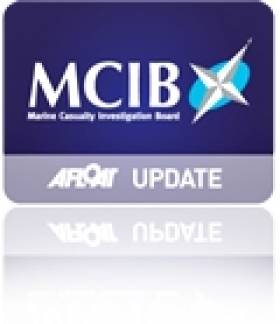Displaying items by tag: Cathal McDaid
Overboard Recovery Systems Recommended After Achill Trawler Drowning
#MCIB - The Marine Casualty Investigation Board (MCIB) has recommended the use of man overboard recovery systems on board fishing vessels after the death of a crewman on the MFV Mark Amay II off Achill Island last year.
Cathal McDaid drowned after being carried overboard from the four-man fishing trawler when he stumbled on the boat's launching net while crossing the deck on the morning of 10 May 2011.
The MCIB report found that McDaid apparently lost his safety helmet and hit his head either on the stern ramp as he was being carried over, or against the hull of the vessel while in the water, possibly rendering him unconscious - which explains why efforts by the crew to throw him a lifebelt proved fruitless.
The situation was compounded by McDaid's choice of personal flotation device. Though he was wearing a PFD on deck, as were all crew members, it was of the waistcoat kind without a collar "that will not turn the wearer onto his back and keep his head out of the water".
Had he been wearing such a collar, it would have "significantly reduced the likelihood of his drowning".
Conditions at the time of the incident were also very poor, with force 5 to 6 south-easterly winds and seas of up to 5 metres, with the vessel pitching severely, which made it impossible for the crew to put a wire line around McDaid and hoist him aboard.
He was instead pulled into the vessel's liferaft, where fellow crew Charles McDaid and Joáo da Silva alternately administered CPR to little avail.
The crew contacted Malin Head Coast Guard, which tasked the Sligo-based Rescue 118 helicopter to the scene, some 52 nautical miles west of Achill Beg.
The Irish Coast Guard aircraft arrived some 90 minutes later and winched Cathal McDaid aboard, flying him directly to a waiting ambulance at Sligo Airport, where he was pronounced dead on arrival.
In its official report into the incident, the MCIB noted that McDaid had been standing on the deck against the established safety rule for the vessel's crew that no standing on the trawl deck is permitted when the net is being shot.
It also found that had his safety helmet been properly secured, it may have prevented the blow to the head from rendering him unconscious, and that had be been equipped with a safety harness it may have stopped him from being dragged overboard by the net when he fell on deck.
The most significant conclusion, however, was that no formal arrangement was in place on the Mark Amay II to recover a crewman from the water.
To this end, the MCIB recommends that "a proprietary type of man overboard recovery system, such as the Jonbuoy MOB Recovery Module or similar be available on board and that all crew are trained in its use". It is also recommended that the Minister for Transport consider issuing a marine notice to that effect.
The full report on the Mark Amay II incident is available to download via the link below.






























































